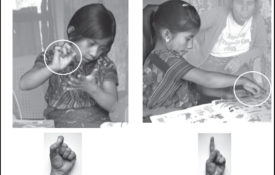-

New Research in Psychological Science
A sample of research on how mnemonic content and hippocampal patterns shape our judgment of time, well-being and cognitive resilience, face familiarization, the prioritization of due process, and much more. Visit Page
-
Your Native Tongue Holds a Special Place in Your Brain, Even if You Speak 10 Languages
Most people will learn one or two languages in their lives. But Vaughn Smith, a 47-year-old carpet cleaner from Washington, D.C., speaks 24. Smith is a hyperpolyglot—a rare individual who speaks more than 10 languages. In Visit Page
-

The Self-Taught Vocabulary of Homesigning Deaf Children Supports Universal Constraints on Language
Researchers compared how young homesigners—deaf children without access to an established sign language—and English-, Spanish-, and Chinese-speaking adults describe the use of tools such as paintbrushes and knives. Visit Page
-

Communicating Psychological Science: The Importance of Common Language
Özge Gürcanlı Fischer-Baum explores the often overlooked need to create a common language between specialists and non-specialists. Visit Page
-

New Research in Psychological Science
A sample of research on personality across the world and face impressions, perceptual and cognitive judgments, cognitive control in lemurs, attitude change, fear, social touch, and much more. Visit Page
-

New Content From Current Directions in Psychological Science
A sample of articles on conceptual clarification, language acquisition, insights from deep neural networks, how to reduce academic procrastination, improve learning, craving, and more. Visit Page

